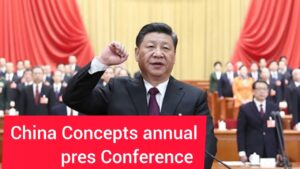China Cancels Annual Press Conference: Transparency Concerns Cloud Economic and Political Landscape

In a move that surprised many, the Chinese government announced on March 4, 2024, the cancellation of the annual press conference held by the Premier at the conclusion of the National People’s Congress (NPC) session. This press conference was one of the few opportunities for international media to directly question a top Chinese leader.
The announcement, made by Lou Qinlan, spokesperson for the NPC, stated that Premier Li Qiang would not hold a press conference this year “if there are no special circumstances.” Lou further mentioned plans to increase opportunities for journalists to interact with government ministers and delegates to the NPC, but this move has been met with skepticism by some observers.
A Window Closed: Scrutiny and Accountability
The elimination of the press conference raises concerns about transparency and accountability within the Chinese government. This annual event was a crucial platform for the international media to press Chinese leadership on issues ranging from economic growth and trade to human rights and foreign policy.
Experts believe the cancellation could signal a shift towards tighter information control. The press conference, though tightly scripted and controlled, offered a glimpse into the priorities and perspectives of the Chinese leadership. Its absence may make it more difficult for foreign governments, businesses, and the public to understand China’s policy direction.
Economic Woes and Political Maneuvering
The timing of the announcement also fuels speculation. China’s economy is facing significant headwinds, including a slowdown in its real estate sector and ongoing trade tensions with the United States. Premier Li Qiang might be hesitant to face questions on these sensitive topics.
Additionally, the announcement comes amidst a period of political consolidation for President Xi Jinping. Xi has secured a historic third term as leader of the Communist Party and is expected to further strengthen his grip on power. The cancellation of the press conference could be seen as a move to limit public scrutiny and consolidate control over the flow of information.
Alternative Avenues or a Chilling Effect?
The Chinese government has offered alternative avenues for media interaction, such as increased access to ministerial briefings and interactions with NPC delegates. However, some analysts believe these alternative platforms may not be as effective. Ministerial briefings are often less open and transparent than press conferences with the Premier. Interactions with NPC delegates may be less focused and less likely to yield substantive information.
The cancellation of the press conference could also have a chilling effect on domestic media. Journalists within China might be more hesitant to ask critical questions or report on sensitive topics for fear of reprisal. This could further restrict the flow of information within China and limit public discourse on critical issues.
International Reactions and the Road Ahead
The international community has expressed concern about the cancellation of the press conference. The move has been criticized by foreign governments, press freedom groups, and business organizations.
The United States, for example, has called on China to “uphold its international commitments to freedom of the press.” Press freedom groups have warned that the cancellation could lead to a further deterioration of media freedom in China.
The decision to abolish the press conference is likely to have a lasting impact on China’s relationship with the international community. It remains to be seen whether the promised alternative avenues for media interaction will be sufficient to address concerns about transparency and accountability.
The international community will be watching closely to see how China handles press freedom and information control moving forward. While China’s economic and political trajectory remains a significant global concern, the recent move regarding the press conference signals a potential shift towards a more closed and controlled information environment.
Your article helped me a lot, is there any more related content? Thanks!